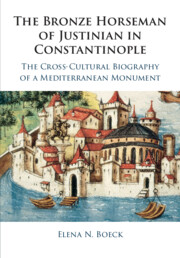 The Bronze Horseman of Justinian in Constantinople
The Bronze Horseman of Justinian in Constantinople Book contents
- The Bronze Horseman of Justinian in Constantinople
- The Bronze Horseman of Justinian in Constantinople
- Copyright page
- Contents
- Figures and Maps
- Tables
- Acknowledgements
- Abbreviations
- Note on Transliteration and Naming Conventions
- Selected Timeline of the Triumphal Column of Justinian and Its International Reverberations
- Map of Constantinople
- Introduction
- 1 Justinian’s Entry into Constantinople: He Came, He Saw, He Conquered
- 2 The Making of Justinian’s Forum
- 3 Defying a Defining Witness: the Bronze Horseman and the Buildings (De Aedificiis) of Prokopios
- 4 The Horseman of Baghdad Responds to the Horseman of Constantinople
- 5 Soothing Imperial Anxieties: Theophilos and the Restoration of Justinian’s Crown
- 6 Debating Justinian’s Merits in the Tenth Century
- 7 The Bronze Horseman and a Dark Hour for Humanity
- 8 The Horseman Becomes Heraclius: crusading Narratives of the Eleventh and Twelfth Centuries
- 9 From Exile in Nicaea to Restoration of Constantinople
- 10 A Learned Dialogue across the Ages: Pachymeres Confronts Prokopios
- 11 Orb-Session: Constantinople’s Future in the Bronze Horseman’s Hand
- 12 Justinian’s Column and the Antiquarian Gaze: a Centuries-Old “Secret” Exposed
- 13 A Timeless Ideal: Constantinople in Slavonic Imagination of the Fourteenth–Fifteenth Centuries
- 14 The Horseman Meets Its End
- 15 Horse as Historia, Byzantium as Allegory
- 16 Shadowy Past and Menacing Future
- 17 After the Fall: the Bronze Horseman and the Eternal Tsar’grad
- Postscript: the Horseman’s Debut in Print
- Select Bibliography
- Index
6 - Debating Justinian’s Merits in the Tenth Century
Published online by Cambridge University Press: 08 April 2021
- The Bronze Horseman of Justinian in Constantinople
- The Bronze Horseman of Justinian in Constantinople
- Copyright page
- Contents
- Figures and Maps
- Tables
- Acknowledgements
- Abbreviations
- Note on Transliteration and Naming Conventions
- Selected Timeline of the Triumphal Column of Justinian and Its International Reverberations
- Map of Constantinople
- Introduction
- 1 Justinian’s Entry into Constantinople: He Came, He Saw, He Conquered
- 2 The Making of Justinian’s Forum
- 3 Defying a Defining Witness: the Bronze Horseman and the Buildings (De Aedificiis) of Prokopios
- 4 The Horseman of Baghdad Responds to the Horseman of Constantinople
- 5 Soothing Imperial Anxieties: Theophilos and the Restoration of Justinian’s Crown
- 6 Debating Justinian’s Merits in the Tenth Century
- 7 The Bronze Horseman and a Dark Hour for Humanity
- 8 The Horseman Becomes Heraclius: crusading Narratives of the Eleventh and Twelfth Centuries
- 9 From Exile in Nicaea to Restoration of Constantinople
- 10 A Learned Dialogue across the Ages: Pachymeres Confronts Prokopios
- 11 Orb-Session: Constantinople’s Future in the Bronze Horseman’s Hand
- 12 Justinian’s Column and the Antiquarian Gaze: a Centuries-Old “Secret” Exposed
- 13 A Timeless Ideal: Constantinople in Slavonic Imagination of the Fourteenth–Fifteenth Centuries
- 14 The Horseman Meets Its End
- 15 Horse as Historia, Byzantium as Allegory
- 16 Shadowy Past and Menacing Future
- 17 After the Fall: the Bronze Horseman and the Eternal Tsar’grad
- Postscript: the Horseman’s Debut in Print
- Select Bibliography
- Index
Summary
In the tenth century the character of the bronze horseman grew even more complex. As the horseman became a preeminent imperial landmark, it made some Orthodox observers uncomfortable. A comparison of perspectives from different strata of Constantinopolitan society reveals tensions over the horseman. While both Constantine of Rhodes and the Narrative on the Construction of Hagia Sophia praise Constantinople, they create very different emotional and narrative frameworks for evaluating Justinian’s column and the emperor’s legacy. While for Constantine of Rhodes (and like-minded individuals at court) Justinian’s monument is the greatest wonder of Constantinople, for the pious author of the Narrative it signifies imperial hubris. Likewise, Constantine of Rhodes is at ease with elevating Justinian’s stupendous accomplishments, while the Narrative is cautious about his legacy. During this period the mosaic of the south-west vestibule of Hagia Sophia also attempted to institutionalize and normalize the discourse of Justinian’s greatness not only in the imperial sphere, but also in Orthodoxy.
Keywords
Information
- Type
- Chapter
- Information
- The Bronze Horseman of Justinian in ConstantinopleThe Cross-Cultural Biography of a Mediterranean Monument, pp. 137 - 154Publisher: Cambridge University PressPrint publication year: 2021